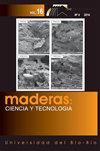Gluing characteristics of Papua New Guinea timber species for various non-structural applications
IF 1.5
4区 农林科学
Q2 Agricultural and Biological Sciences
引用次数: 0
Abstract
Papua New Guinea (PNG) has abundant natural forest resources but there are many constraints which need to be addressed to support the development of competitive value-added wood industries. There is a need to develop knowledge and capacity in wood science and processing technologies which support successful domestic value-adding wood processing enterprises. A comprehensive testing program has been developed to assess the glue‐bond strength and performance of selected commercial PNG timber species in various climatic conditions to simulate service conditions in potential market destinations. Two criteria namely shear strength and wood failure have been used to determine if a species can meet the minimum requirements for either dry use or wet use applications. The performance of 24 different PNG commercial timber species has been assessed using a one-component cross-linking polyvinyl acetate emulsion adhesive. The bondability of the selected species has been carefully estimated considering the wood density and wood moisture content for the strength and durability in dry- and wet-use conditions. The testing results show that as the wood density as a wood property factor and moisture content as a service condition factor increase, high shear strength with high wood failure become more difficult to achieve consistently. The highest shear strength and wood failure results were achieved by softwood plantation species and low-density hardwood species. Based on the testing results, the selected species have been classified into bondability classes (bond very well, bond well, bond with difficulty, very difficult to bond).巴布亚新几内亚各种非结构用途木材的胶合特性
巴布亚新几内亚拥有丰富的自然森林资源,但要支持发展具有竞争力的增值木材工业,需要解决许多制约因素。有必要发展木材科学和加工技术方面的知识和能力,以支持成功的国内增值木材加工企业。为了模拟潜在市场目的地的使用条件,我们开发了一个全面的测试程序,以评估选定的商用PNG木材品种在各种气候条件下的粘合强度和性能。两个标准即抗剪强度和木材破坏已被用来确定一个物种是否能满足干用或湿用应用的最低要求。使用单组分交联聚醋酸乙烯酯乳液粘合剂评估了24种不同的PNG商业木材的性能。考虑到木材密度和木材含水率在干燥和潮湿使用条件下的强度和耐久性,所选树种的粘结性已被仔细估计。试验结果表明,随着木材密度(木材性能因子)和含水率(木材使用条件因子)的增加,高抗剪强度与高破坏的一致性变得越来越困难。针叶人工林树种和低密度硬木树种的抗剪强度和木材破坏效果最高。根据测试结果,将所选树种分为键合性等级(键合非常好、键合良好、键合困难、键合非常困难)。
本文章由计算机程序翻译,如有差异,请以英文原文为准。
求助全文
约1分钟内获得全文
求助全文
来源期刊

Maderas-Ciencia Y Tecnologia
MATERIALS SCIENCE, PAPER & WOOD-
CiteScore
2.80
自引率
13.30%
发文量
33
审稿时长
>12 weeks
期刊介绍:
Maderas-Cienc Tecnol publishes inedits and original research articles in Spanish and English. The contributions for their publication should be unpublished and the journal is reserved all the rights of reproduction of the content of the same ones. All the articles are subjected to evaluation to the Publishing Committee or external consultants. At least two reviewers under double blind system. Previous acceptance of the Publishing Committee, summaries of thesis of Magíster and Doctorate are also published, technical opinions, revision of books and reports of congresses, related with the Science and the Technology of the Wood. The journal have not articles processing and submission charges.
 求助内容:
求助内容: 应助结果提醒方式:
应助结果提醒方式:


